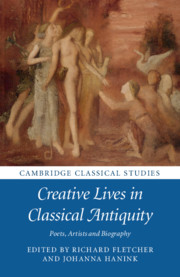Book contents
- Frontmatter
- Contents
- List of contributors
- List of illustrations
- Part I Opening remarks
- Part II Reviving dead poets
- Part III Lives in unexpected places
- 5 A poetic possession: Pindar's Lives of the poets
- 6 What's in a Life? Some forgotten faces of Euripides
- 7 Lives from stone: epigraphy and biography in classical and Hellenistic Greece
- Part IV Laughing matters and Lives of the mind
- Part V Portraits of the artist
- Works cited
- Index
7 - Lives from stone: epigraphy and biography in classical and Hellenistic Greece
from Part III - Lives in unexpected places
Published online by Cambridge University Press: 01 December 2016
- Frontmatter
- Contents
- List of contributors
- List of illustrations
- Part I Opening remarks
- Part II Reviving dead poets
- Part III Lives in unexpected places
- 5 A poetic possession: Pindar's Lives of the poets
- 6 What's in a Life? Some forgotten faces of Euripides
- 7 Lives from stone: epigraphy and biography in classical and Hellenistic Greece
- Part IV Laughing matters and Lives of the mind
- Part V Portraits of the artist
- Works cited
- Index
Summary
Inscriptions of the classical and, especially, Hellenistic periods can be a rich source of information for those interested in reconstructing the details of the lives of statesmen, as well as the creative lives of poets and philosophers. This is not, of course, a novel observation: the potential utility of inscriptions as a source for biography and biographers has been recognised since antiquity. But this turn to epigraphic evidence seems often to happen in spite of, rather than because of, the biographical qualities of the inscriptions themselves. Greek epigraphy of this period is a largely, even distinctively, non-biographical, and non-autobiographical, type of writing, not only in comparison with literary texts but also when contrasted with epigraphic material from other places and periods. There is no obvious classical Greek equivalent to a text such as Augustus’ Res Gestae, or (looking to the east), the Bisitun inscriptions. Greek epitaphs (with a few, rare, exceptions) fail to provide even the most basic biographical data about the individuals they commemorate: no dates of birth or death, no ages, very little information about positions held or activities undertaken. Classical Greek honorific decrees, again with a few exceptions, characteristically provide a rich store of abstract claims about the honorand's virtues, but almost no information about the actions or events in which those virtues were manifested.
However, there is still some scope for exploring the connection between Greek epigraphic texts and ancient (and modern) biographical traditions, and the discussion which follows attempts to do this from two different directions. First (and more briefly) the ways in which ancient texts use and abuse epigraphic evidence in their attempts to create ancient lives will be considered. The second part shifts the focus to the inscriptions themselves, exploring (and offering some explanations for) their rather arms-length relationship with biography. Finally, I offer a brief discussion of an apparently rule-proving exception: the inscriptions from the Archilocheion on Paros.
Epigraphic biography
Ancient authors quote or refer to inscriptions (both real and fictitious) in their texts for various reasons: to reinforce their arguments or rebut those of their rivals; to display their expertise; to add interest to their narrative; or simply because reference or allusion to inscriptions had become an expected part of the genre in which they were working.
- Type
- Chapter
- Information
- Creative Lives in Classical AntiquityPoets, Artists and Biography, pp. 147 - 174Publisher: Cambridge University PressPrint publication year: 2016
- 3
- Cited by



